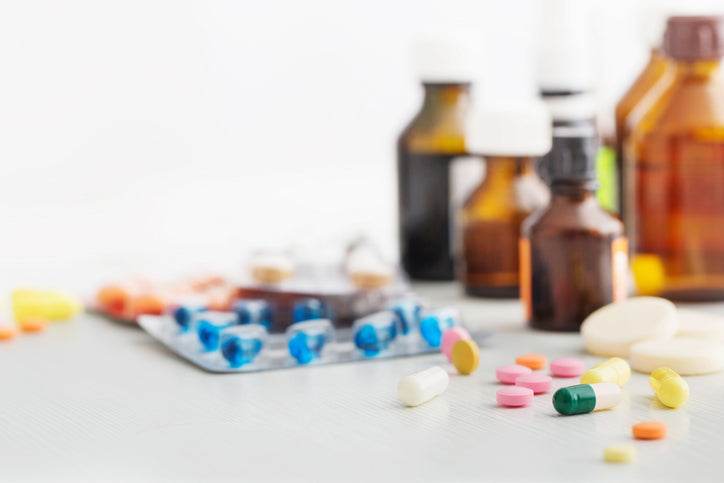
Do Medications Affect Scar Formation and Scar Healing?
|
|
Time to read 3 min
|
|
Time to read 3 min
Do medications affect scar formation and scar healing? When your body heals from an injury or surgery, the process is complex and influenced by many factors, including the medications you take. While some prescriptions and over-the-counter drugs are essential for treating health conditions, certain classes of medications can interfere with scar healing and increase the risk of abnormal scars such as keloids or hypertrophic scars.
Understanding which medications affect scar formation is key if you’ve had a recent surgery, deep cut, or injury. Below are the five main classes of drugs that can slow recovery and alter scar outcomes.
There are five major classes of medications known to interfere with wound repair and increase the risk of abnormal scars, including keloids and hypertrophic scars:
NSAIDs (nonsteroidal anti-inflammatory drugs)
Blood thinners (anticoagulants and antiplatelets)
Anticancer medications (antineoplastics)
Immunosuppressants
Corticosteroids
Let’s explore how each type works and why they can make scar healing more challenging.
NSAIDs, such as aspirin, ibuprofen, and naproxen, are commonly used for pain relief, fever reduction, and inflammation control. They work by inhibiting the cyclooxygenase (COX) enzyme, reducing prostaglandin production (linked to inflammation and pain).
However, NSAIDs also block thromboxane, which plays a crucial role in platelet aggregation and blood clotting. Without normal clotting, wounds may bleed longer, slowing healing and potentially worsening scar formation. This delayed recovery can interfere with optimal scar healing and increase the risk of noticeable scars.
Blood thinners help prevent strokes, heart attacks, and blood clots, but they also interfere with normal coagulation. When the body cannot properly form clots, wounds take longer to stop bleeding, delaying the healing process.
This trade-off means patients on anticoagulants face an increased risk of bleeding and delayed wound closure, which can negatively affect scar healing after surgery or injury.
Anticancer medications are designed to halt tumor growth by suppressing cell metabolism, rapid division, and angiogenesis. Unfortunately, these same mechanisms also block critical pathways in wound healing.
By reducing white blood cells, red blood cells, and platelets, antineoplastics make wounds more vulnerable to infection, oxygen deprivation, and bleeding. As a result, patients may experience delayed healing and more visible, persistent scars that complicate long-term scar healing .
Immunosuppressants are prescribed for autoimmune diseases such as rheumatoid arthritis or multiple sclerosis, as well as after organ transplants. They reduce immune activity to prevent tissue damage or rejection.
The downside is that a weakened immune system cannot effectively fight off infection. Research shows that wound infections increase collagen overproduction in scars, leading to raised, discolored scars such as keloids and hypertrophic scars [1]. Because infections are one of the biggest obstacles to scar healing , immunosuppressants carry additional risks for patients recovering from wounds.
Corticosteroids (commonly called steroids) mimic hormones produced by the adrenal glands. They are prescribed for asthma, skin conditions, and inflammatory disorders. While they reduce inflammation, chronic use suppresses the immune system and weakens wound durability.
A study found that long-term corticosteroid use significantly delays healing and compromises the strength of repaired skin tissue [2]. This can result in fragile scars and poor cosmetic outcomes, slowing the overall scar healing process.
If you’ve had a recent surgery or injury, speak with your doctor about how your medications may affect wound healing. In some cases, your physician may recommend dosage adjustments or temporary pauses in treatment to support recovery.
In addition, using silicone scar treatments such as silicone scar sheets and silicone scar gels can help improve scar appearance and support the scar healing process. Medical-grade silicone has been shown to flatten raised scars, reduce discoloration, and protect healing skin.
Other tips to promote scar healing include:
Following your doctor’s wound care instructions closely.
Keeping the wound clean and protected from infection.
Eating a nutrient-rich diet to support tissue repair.
Staying hydrated and avoiding smoking, which slows blood flow and healing.
Medications are life-saving and necessary for many health conditions, but it’s important to understand their side effects on wound recovery. By learning how NSAIDs, blood thinners, chemotherapy drugs, immunosuppressants, and corticosteroids can impact scar healing, patients can take proactive steps to minimize risk.
With the right medical guidance and the use of proven scar therapies like silicone scar sheets and gels, you can support your body’s natural healing process and achieve healthier, less visible scars.
